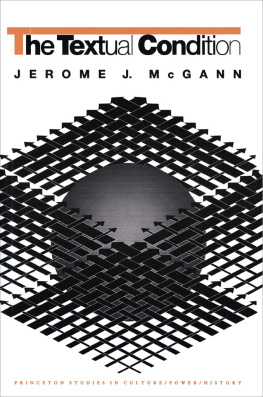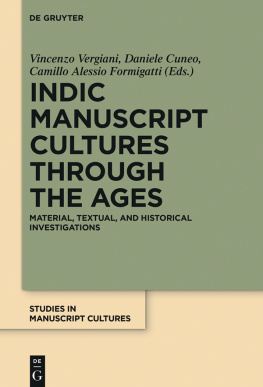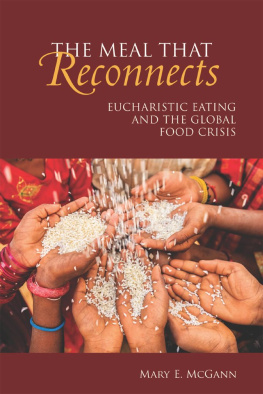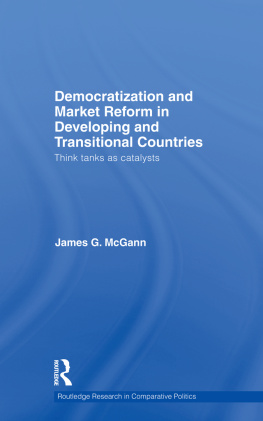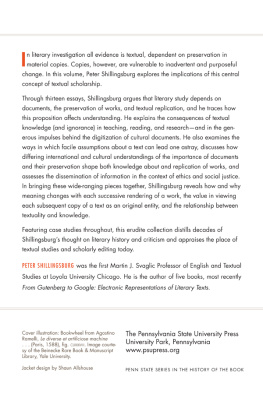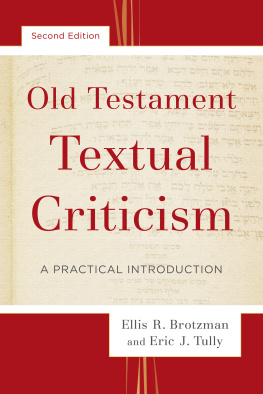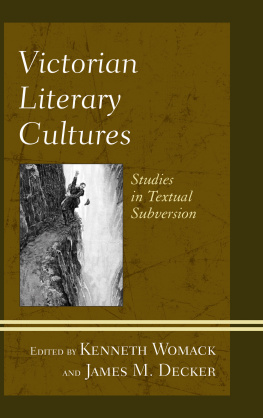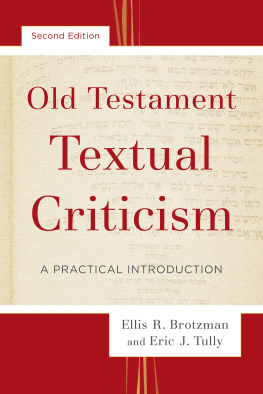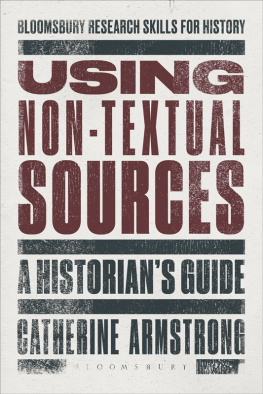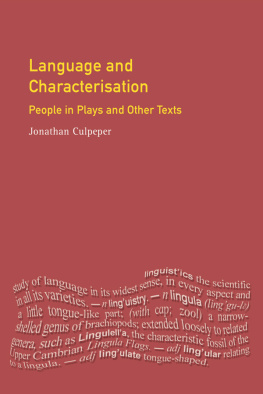T he Textual Condition
EDITORS
Sherry B. Ortner, Nicholas B. Dirks, Geoff Eley
A list of titles in this series appears at the
back of the book


T he Textual Condition
JEROME J. McGANN

Copyright 1991 by Princeton University Press
Published by Princeton University Press, 41 William Street,
Princeton, New Jersey 08540
In the United Kingdom: Princeton University Press,
Chichester, West Sussex
All Rights Reserved
Library of Congress Cataloging-in-Publication Data
McGann, Jerome J.
The textual condition / Jerome J. McGann
p. cm. (Princeton studies in culture/power/history)
Includes bibliographical references and index.
ISBN 0-691-06931-X 0-691-01518-X (pbk.)
eISBN 978-0-691-21775-8
1. English literatureCriticism, Textual. 2. American
literatureCriticism, Textual. 3. English literatureHistory and
criticismTheory, etc. 4. American literatureHistory and
criticismTheory, etc. 5. Pound, Ezra, 1885-1972Criticism,
Textual. 6. Transmission of texts. 7. Criticism, Textual.
8. Editing. I. Title. II. Series.
PR21.M37 1991
801'.959dc20 91-16996 CIP
Excerpts from the following were reprinted by permission:
Ezra Pound: The Cantos of Ezra Pound. Copyright 1934, 1948, 1962, 1968
by Ezra Pound. Reprinted by permission of New Directions
Publishing Corporation.
R0
FOR VIRGIL

The eyes of fire, the nostrils of air,
the mouth of water, the beard
of earth.
You cant have art without
resistance in the material.
William Morris

Illustrations
Preface
is so closely tied to the form of the texts first presentation, I have kept the signs of its original textuality. The contradiction which necessarily appears when one reads this text in its bookish form is, however, a positive virtue, so far as the general argument of this book is concerned.
in The Library Chronicle of the University of Texas at Austin 20 (1990): 13-37.
I am grateful to the New Directions Corporation and The William Blake Trust for giving permission to reproduce various illustrations included here.
For help of so many kinds I wish to thank in particular Charles Bernstein, Nick Dirks, Robert Essick, David Greetham, Susan Howe, Steve McCaffery, Randall McLeod, Marjorie Perloff, Lawrence Rainey, Jeffrey Skoblow, and my friends at the University of Texas at Austin and Texas A&M University. Also, the Center for Advanced Studies, University of Virginia, provided me with time and money, for which special thanks are due to Paul Gross, Hugh Kelly, and Dexter Whitehead.
Finally, and first of all, there is Virgil Burnett, that master of unnamd forms who first opened my eyes to these and other things many years ago.
T he Textual Condtion

Texts and Textualities
BOTH THE PRACTICE and the study of human culture comprise a network of symbolic exchanges. Because human beings are not angels, these exchanges always involve material negotiations. Even in their most complex and advanced formswhen the negotiations are carried out as textual eventsthe intercourse that is being human is materially executed: as spoken texts or scripted forms. To participate in these exchanges is to have entered what I wish to call here the textual condition.
The sexual event itselfwhich is, as the poets have always known, a model of the textual conditioninvolves far more than the intercourse of reproductive organs. The climactic marriage of our persons is most completely experienced as a total body sensation almost mystical in its intensity as in its meaning. In those moments we realize (in both senses of the word) that to be human is to be involved with another, and ultimately with many others. Beyond that great and strange experience of immediacy the sexual event organizes a vast network of related acts of intercourse at the personal as well as more extended social levels: courtship rituals, domestic economies, political exchanges, and so forth. All of these activities take multiple particular forms. Love, even romantic love, is a social event, as Romeo and Juliet or Werther will always remind us. As such, love is and has ever been one of the great scenes of textuality.
These elective affinities between love and textuality exist because love and text are two of our most fundamental social acts. We make love and we make texts, and we make both in a seemingly endless series of imaginative variations.
This book is an inquiry into the nature of texts and textuality. The inquiry is grounded in the thought that texts representare in themselvescertain kinds of human acts. This idea may appear so unexceptionable as to stand beyond the need of dispute, perhaps even beyond the need of elaboration. But our cultures now dominant conceptions of textuality are in fact very different. Today, texts are largely imagined as scenes of reading rather than scenes of writing. This readerly view of text has been most completely elaborated through the modern hermeneutical tradition in which text is not something we make but something we interpret. The difference from the approach taken in the present study is crucial.
Well, of course texts are writtenor spoken. No one denies that. But texts have to be read in order to be understood. Textuality is a scene in which readers respond to the texts they encounter. If one locates the reader at the center of textuality, it is because the text is passive and silent, because it needs the readers activity to infuse it with meaning, to bring it back to life.
So reading is a textual activity.
Most definitely.
But tell me, when and whereand howdoes the activity of reading take place? Is it an affair of the mind alone, of the individual standing silent before the mute text, building invisible cities of meaning to unheard melodies of truth? If so, how do we engage with those secret interior textsif in fact we can call them texts at all?
Reading appears always and only as text, in one or another physically determinate and socially determined form. This is not to deny either the reality or the importance of silent and individual reading. It is merely to say that textuality cannot be understood except as a phenomenal event, and that reading itself can only be understood when it has assumed specific material constitutions. Silence before a text is neither our best nor our oldest model of textuality. Indeed, insofar as it is a textual model at all, it has been licensed by another (prior) model altogether.

